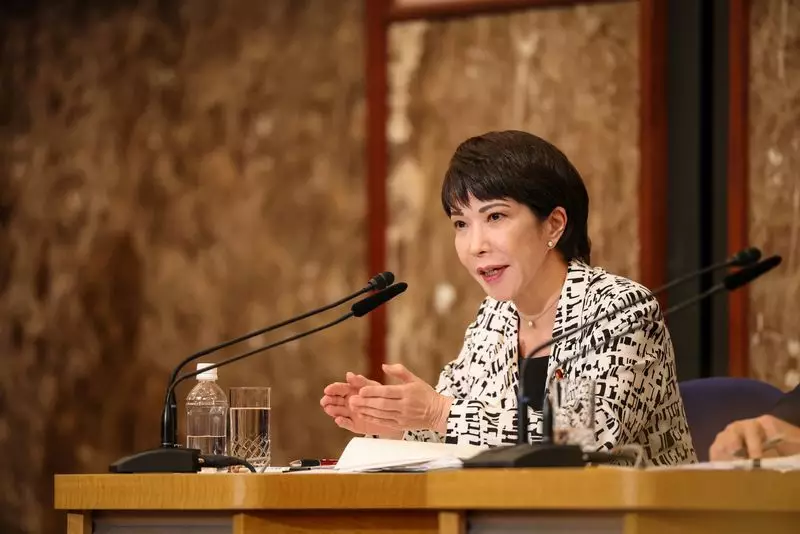In the wake of Japan’s ongoing economic recovery, the leadership of the country plays a crucial role in determining the direction of monetary policy. Recently, Sanae Takaichi, the minister in charge of economic security and a noteworthy contender for the leadership of Japan’s ruling Liberal Democratic Party (LDP), emphasized the need for the Bank of Japan (BOJ) to maintain ultra-low interest rates. This suggestion is particularly relevant as the government prepares for significant transitions with the impending leadership election, poised to shape the economic landscape in which Japan operates.
During a press briefing that included other candidates in the race for party leadership, Takaichi argued that the timing of the BOJ’s recent interest rate hikes has been premature. Her perspective underscores a growing apprehension surrounding Japan’s fragile economic state—habituated by years of low growth and inflationary concerns. The recent metrics show some progress toward the BOJ’s target inflation rate of 2%, yet Takaichi warns that the economic recovery is not yet robust enough to warrant such a shift in monetary policy.
Takaichi’s advocacy for keeping interest rates low was not incidental; it followed her public statements on her YouTube channel, where she reiterated the necessity for sustained fiscal and monetary support targeted at propelling economic recovery. Her insights are critical in assessing the broader implications of the BOJ’s policies, particularly as Japan has recently moved from a negative interest environment. The BOJ’s decision to raise short-term rates to a mere 0.25% in July showcased a newfound optimism toward economic stability. However, Takaichi’s argument raises questions about the effectiveness of such optimism in the real economy, especially given the uncertainty surrounding consumer confidence and spending.
As Japan’s economic health hangs in the balance, Takaichi’s positions reflect a broader skepticism among various stakeholders when it comes to the sustainability of current recovery trends. Her assertions symbolize a desire to avoid abrupt changes in interest rates that could stifle ongoing economic activity.
The upcoming LDP leadership election, slated for September 27, has further intensified the discourse on monetary policy. With Prime Minister Fumio Kishida stepping down, the new leader will inherit not only a divided party but also a challenging economic environment, where conflicting perspectives exist regarding fiscal responsibility and growth strategies. The role of the new leader is critical, as their policies will resonate through Japan’s economy, especially as major economic powers like the United States navigate their own fiscal challenges.
Most LDP candidates have proposed packages to mitigate the effects of rising living costs on households, yet many are vague regarding funding these initiatives. This raises crucial questions about sustainability and fiscal responsibility in a nation already burdened by a substantial public debt. Taro Kono, another candidate, ventured into unconventional territory by stressing the importance of not merely increasing expenditures but rather fostering a necessary dialogue on improving fiscal health. His commentary suggests a paradigm shift where economic policy must harmonize with responsible debt management, an essential element for sustained growth.
As Japan deliberates its economic policies, the BOJ’s future rate decisions remain uncertain. A substantial percentage of economists anticipate another rate hike by December, igniting discussions about the potential effects on not just borrowing costs, but also consumer behavior and business investments. Historical data illustrates the susceptibility of consumer activity to rate changes, and a further increase could have cascading effects on the pace of Japan’s recovery.
Moreover, discussions regarding the allocation of Japan’s reserves have emerged. Toshimitsu Motegi’s proposal to utilize reserves set aside for currency intervention in innovative asset investments reflects a growing awareness of the need to reassess traditional financial approaches. By enhancing returns on current assets, Japan could bolster its financial position, paving the way for sustainable growth.
Japan finds itself at a pivotal junction where economic recovery coalesces with leadership transitions. As candidates like Takaichi and Kono present divergent views on monetary and fiscal policies, the central question remains: How will the next leader navigate these complexities to secure a prosperous future for Japan? The choices made in the coming weeks will resonate far beyond the confines of the political landscape, affecting the economic health of Japan for years to come.

